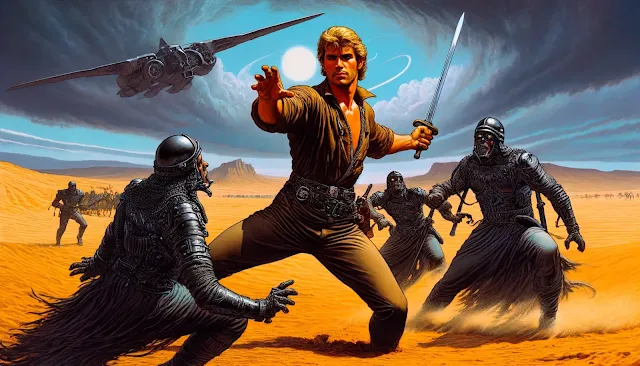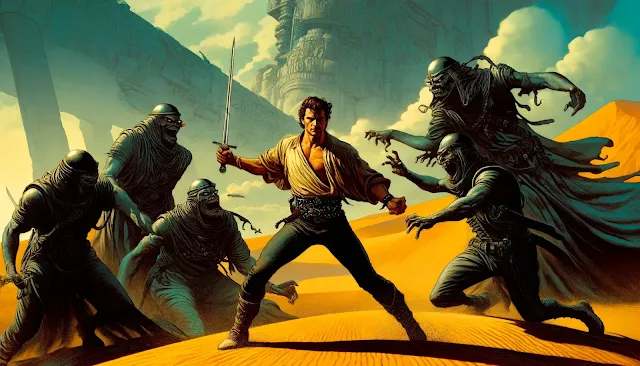The Many Lives of Duncan Idaho: Identity, Memory, and the Infinite Ghola
In the labyrinthine universe of Frank Herbert's Dune, few characters captivate and intrigue as profoundly as Duncan Idaho. His repeated resurrection as a ghola serves as a cornerstone for exploring the series' vast thematic landscape.
Frank Herbert's Dune series stands as a colossus in the realm of science fiction, weaving an intricate narrative that spans millennia and explores the depths of human nature, power, and the environment. At the heart of this narrative is Duncan Idaho. His journey from a loyal swordmaster of House Atreides to a repeatedly resurrected ghola encapsulates the series' exploration of complex themes such as identity, loyalty, memory, and evolution.
Idaho's unique trajectory through the Dune saga allows Herbert, and later his son Brian Herbert along with co-author Kevin J. Anderson, to delve into the philosophical quandaries of cloning, the essence of consciousness, and the potential for human transcendence or degradation. For further context on the prequel era, refer to House of Atreides.

I. The Concept of Gholas in the Dune Universe
The Dune universe, with its intricate political, social, and religious tapestry, introduces the concept of gholas as a pivotal plot mechanism and philosophical inquiry. A ghola is essentially a clone grown from the cells of a deceased individual. The Bene Tleilax—mysterious and morally ambiguous genetic manipulators—can potentially restore these beings to full consciousness and memory of their former lives through a traumatic stimulus.
This process is fraught with ethical, moral, and existential implications. It raises questions about the nature of identity, the continuity of the self, and the boundaries of life and death. Duncan Idaho, originally a gifted and loyal warrior of House Atreides, becomes the most notable and recurrent ghola throughout the series.
His repeated resurrections by the Bene Tleilaxu serve not only as a testament to his undying loyalty to the Atreides but also as a narrative vessel through which Herbert explores the depths of human consciousness. The Tleilaxu, with their enigmatic motivations and capabilities, symbolize the double-edged sword of technological and genetic advancement. They embody the series' cautionary stance on the hubris of attempting to control nature and human destiny.
The ghola of Duncan Idaho represents a confluence of the past and future. He serves as a bridge across the series' sprawling timeline and a mirror reflecting the evolving philosophical and ethical landscapes of the Dune universe. Through the lens of Duncan's resurrections, Herbert interrogates the essence of identity: Is a person defined by their memories, their genetic makeup, or something more intangible?
| Novel | Incarnation Status | Thematic Contribution |
|---|---|---|
| Dune | Original Duncan Idaho | Serves as a loyal swordmaster and confidant to the Atreides. Represents themes of loyalty, valor, and sacrifice. |
| Dune Messiah | Hayt (First Ghola) | Resurrected by the Tleilaxu and gifted to Paul. Challenges Paul with philosophical questions, symbolizing identity and the consequences of power. |
| Children of Dune | Legacy Influence | Mentioned and remembered. His legacy influences the characters and plot, reflecting themes of historical influence and enduring ethics. |
| God Emperor of Dune | Multiple Gholas | Many Duncans are created and killed serving Leto II. Underscores themes of eternal recurrence, humanity, and societal evolution. |
| Heretics of Dune | Post-Scattering Ghola | Resurrected by the Bene Gesserit for his genetic memories. Highlights the search for identity and the complexities of human evolution. |
| Chapterhouse: Dune | Integrated Ghola | Continues from Heretics. Plays a pivotal role in Bene Gesserit strategies, exploring adaptation and survival. |

II. The Significance of Resurrection
Duncan Idaho's continuous rebirths as a ghola in the Dune saga are not mere narrative conveniences. They are rich, thematic veins that Frank Herbert, and subsequently his successors, mine for profound philosophical and ethical exploration. Each resurrection peels back layers, revealing insights into identity, memory, loyalty, and the potential futures of humanity.
Initially introduced as a loyal soldier, Duncan becomes an anchor point for readers through the series' complex socio-political shifts. His continuous presence offers a thread of continuity in a saga spanning thousands of years. Moreover, Duncan's unique status allows Herbert to explore the implications of technological advancements on society. He becomes a vessel for examining how technologies like cloning and memory transfer could redefine humanity's understanding of life and death.
One of the most intriguing aspects is the exploration of identity and memory. Each ghola is initially devoid of the original's memories, living as a tabula rasa until undergoing a traumatic revival. This process raises profound questions: Is the resurrected Duncan the "same" Duncan if he possesses the original's memories? What role do our memories play in making us who we are?
III. Themes of Loyalty and Betrayal
Duncan Idaho's undying loyalty to the Atreides highlights themes of loyalty and betrayal. Each resurrection tests his fidelity under new circumstances, reinforcing the idea that certain core values remain constant even as external conditions change. This constancy serves as a counterpoint to the shifting allegiances and Machiavellian strategies that characterize the political landscape of the Dune universe.
Yet, Duncan's resurrections also introduce the potential for betrayal. Characters within the series often question the reliability of a ghola, pondering whether the Tleilaxu could have implanted hidden loyalties or objectives. This suspicion reflects broader concerns about the manipulation of genetic material and memories, suggesting that technological mastery over life can lead to profound ethical dilemmas.

IV. Reflections on Human Nature and Evolution
Finally, Duncan Idaho's repeated rebirths offer a lens through which the Dune series reflects on human nature and evolution. Each ghola represents a blending of the natural and the artificial, challenging notions of what it means to be human. Herbert posits that humanity's future evolution might not be purely biological but augmented by technology and shaped by our understanding of consciousness.
Furthermore, Duncan's ability to integrate memories from multiple lifetimes hints at a potential new stage in human development. He becomes a being where accumulated wisdom and experiences can be passed down directly, transforming individual and collective understanding. This concept resonates with the series' broader themes of historical cycles and the possibility of transcending them.
V. The Philosophical and Ethical Implications
The resurrections of Duncan Idaho usher readers into a complex web of philosophical inquiries. These reflections orbit around the manipulation of life, the definition of identity, and the moral dimensions of technological advancement. The creation of gholas by the Tleilaxu raises fundamental ethical questions about cloning and the restoration of consciousness.
Moreover, the series probes the rights of gholas and the nature of consent. Can a ghola truly consent to its creation or the restoration of its memories? The ethical complexities are magnified by the potential for gholas to be used as tools for political ends. Duncan often finds himself in this position, raising concerns about autonomy and the commodification of human life.
Conclusion: The Eternal Soldier
The character arc of Duncan Idaho extends beyond his individual storylines to influence the saga’s overarching themes. As a symbol of loyalty, resilience, and the quest for identity, Duncan’s legacy is a testament to the enduring human spirit. His journeys as a ghola enrich the series' exploration of cyclical history and the evolution of consciousness.
His unique perspective as a character who bridges different eras provides critical insights into the dangers of absolute power and the search for meaning in a cosmos indifferent to individual destinies. Duncan's evolving relationship with the Atreides highlights the series' exploration of love and the interconnectivity of all life.
Note on the Cinematic Universe: We suspect that it would be wise for Jason Momoa to return as a ghola of the character in Villeneuve's Dune Messiah. The path of the Duncan is far from over.















